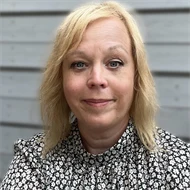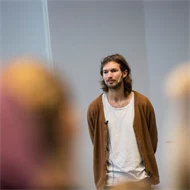Technology Enhanced Learning
The course Technology enhanced learning is part of the package of qualifying courses in teaching and learning in higher education. The course targets employees at Mid Sweden University. If necessary, the course may be given in English.
Entry requirements: higher education exam
Level: advanced (second cycle)
Duration: 2 weeks (equivalent to 3 course credits)
Department: Division of Research and Educational Support
Course description revised: 2024-09-18
Aim
The aim of the course is for the participant to develop their pedagogical competence by reflecting on, problematizing and discussing technology-supported learning, learning activities and learning environments from both a theoretical and a practical perspective.
Learning outcomes
After completing the course, in addition to the general objectives in Chapter 1, Section 9 of the Swedish Higher Education Act for the second cycle, the participant should be able to:
- describe, analyze, and reflect on what technology-supported learning means in higher education based on relevant pedagogical theories and their own practice
- reflect on how the development of physical and digital learning environments, in relation to current pedagogical theories and their own practice, contributes to student learning
- individually and collaboratively reflect on and problematize the challenges and opportunities related to technology-supported learning in the planning, implementation, and evaluation of various learning activities in different learning environments.
Content
The course consists of the following parts:
- Pedagogical theories related to technology enhanced learning
- Methods and tools for technology enhanced learning
Teaching and study forms
The course is based on the principle of active exchange of knowledge between teachers from all subject fields and thus presupposes participation in all teaching sessions.
The course runs during ten weeks, equivalent to two weeks fulltime studies (rate of study 20%) with four teacher directed learning sessions. The sessions will take place both online, campus (ALC) and blended (subject to change due to prevailing circumstances with covid-19). During the course, the following study forms will be used:
- Webinars / workshops
- Group discussions
- Individual assignments
Assessment and grading
The grades used for the course are Pass (G) and Fail (U). In order to get the grade Pass (G), the participant should have gained a pass from all the assessed course components and he or she should have also attended at all teaching sessions.
The examination in the course is continuous and consists of individual assignments that can be completed in several stages and with the help of peer review.
Course literature
Note! The course literature is preliminary and may be subject to change up to one month before the course starts.
Bates, Tony (2022). Teaching in a Digital Age. Third edition. https://pressbooks.bccampus.ca/teachinginadigitalagev3m/
Lundmark, Sofia & Kontio, Janne (2022). Digitala didaktiska dilemman. Stockholm: Natur & Kultur.
Sundgren, Marcus (2023). Exploring Digital Technologies in Higher Educational Settings: Enabling a Community of Inquiry. [Doktorsavhandling] Mittuniversitetet.
Basilotta-Gómez-Pablos, Verónica , Matarranz, María, Casado-Aranda, Luis-Alberto & Otto, Ana (2022). Teachers’ digital competencies in higher education: a systematic literature review. International Journal of Educational Technology in Higher Education 19(8).
Wise, Beck, Emerson, Lisa, Van Luyn, Ariella, Dyson, Bronwen, Bjork, Colin, Thomas & E Susan (2023). A scholarly Dialogue: writing scholarship, authorship, academic integrity and the challenges of AI. https://doi.org/10.1080/07294360.2023.2280195
+ literature of your choice.
Reference literature
Cleveland-Innes, Martha & Garrison, Randy (2020). An introduction to distance education - Understanding Teaching and Learning in a New Era. Milton Park: Routledge. (Available as an e-book from the university library.)
Diaz, Patricia, Frykman, Malin och Willermark, Sara (2023). Lärande i en digitaliserad värld. Stockholm: Liber.
Diaz, Patricia och Lundin, Joanna (2024). God undervisning – med digitala och analoga verktyg. Lund: Studentlitteratur.
Zhao, Yu, Pinto Llorente, Ana María, & Cruz Sánchez Gómez, María (2021). Digital competence in higher education research: A systematic literature review, Computers & Education, 168(104212).
Further articles and films will be added.
Course Start and Registration
The course will be offered during the Spring Term 2025.
Please note that the course can be conducted in English, but you can always submit your assignments in Swedish. Group discussions can also be conducted in both languages, depending on the needs. More information will be provided at least one month before the course starts when the welcome letter is sent out.
Course Period
During 2025 the course runs at sixth speed from week 8 to 18, with course meetings
- February 26, 09:00 - 12:00
- March 12, 09:00 - 12:00
- March 26, 09:00 - 12:00
- April 16, 09:00 - 12:00
Registration is now closed.

